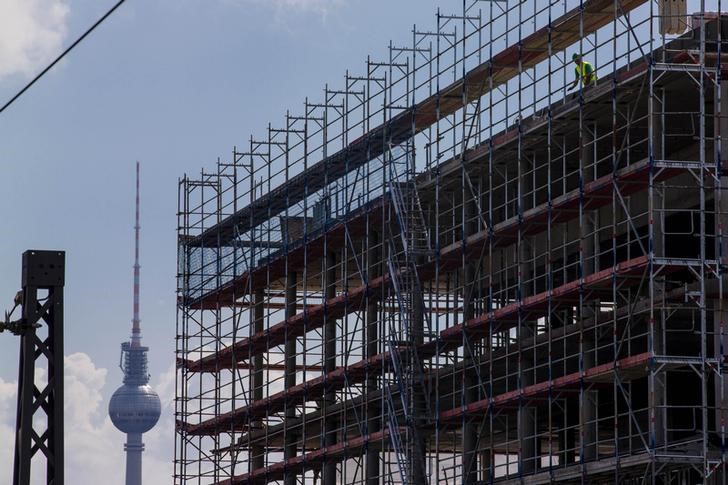By Paul Carrel
BERLIN (Reuters) - Economic growth in the euro zone slowed in the second quarter as France stagnated and Italy lost momentum, held back by an uncertain global outlook that is even weakening investment in powerhouse Germany.
Growth in the 19-country currency bloc slowed to 0.3 percent, missing expectations for a 0.4 percent quarterly expansion that would have matched the first quarter.
This relatively meagre growth came against a backdrop of heavy monetary stimulus from the European Central Bank and a weak euro that boosted exports.
A Reuters poll on Thursday found economists expecting a 0.4 percent per quarter plateau for the euro zone until the end of next year. [ECILT/EU]
"The impact from slower growth in China will likely be largely offset by robust demand from the U.S. and the UK," said Holger Schmieding at Berenberg bank, forecasting 0.3 percent growth in the third quarter and 0.4 percent in the fourth.
In Germany, Europe's largest economy, growth accelerated slightly to 0.4 percent in the second quarter from 0.3 percent in the first, but was below expectations for a 0.5 percent expansion as weak investment acted as a drag.
Friday's euro zone growth readouts came a day after the minutes of the European Central Bank's last meeting showed it was concerned that volatility in Chinese markets may have more impact than expected on the euro zone.
China has seen a run of weak economic data. China's decision to devalue the currency on Tuesday by pushing its official guidance rate down 2 percent has also sparked fears of a "currency war" and roiled global financial markets.
"Of course, if China were to cause major contagion across emerging markets, growth in core Europe would suffer a little despite positive domestic fundamentals," said Schmieding.
Such uncertainty is holding back businesses.
The mood among analysts and investors in Germany worsened in August due to concerns about the effect of an unstable global economic backdrop on the country's export-dependent economy, a survey showed on Tuesday.
Around half of Germany's 30 blue-chip companies reported consensus-beating financial results for the April-June period. More than two thirds nonetheless stuck with their guidance for the year as a whole as geopolitical and economic uncertainties remain for the second half of the year.
EURO FACTOR
Germany's Federal Statistics Office said of the GDP numbers that weakness in investment and a marked drop in inventories weighed on growth in the second quarter, while the weaker euro helped support exports.
The euro fell sharply at the start of the year, shedding more than 8 percent on a trade-weighted basis between January and March - its weakest quarter ever <EUREER=ECBF>. The single currency did gain back some ground in the second quarter, rising just over 2 percent, but since the start of the year it is down almost 6 percent.
In France, the currency area's second biggest economy, a jump in exports was not strong enough to offset the impact of weak consumer spending and changes in inventories and growth came to a standstill after a strong first quarter.
The ECB described the recovery in the 19-country euro zone as moderate and gradual, a trend it called "disappointing", and said an increase in U.S. interest rates might slow the upturn.
Italy's economy grew by 0.2 percent in the second quarter after 0.3 percent in the first as a weak recovery from three years of recession lost momentum.
Economic reports from northern euro zone economies also gave little reason for optimism even though they have been spared the worst of the currency bloc's debt crisis.
In the Netherlands, the economy grew by 0.1 percent on the quarter in the April-June period.
In Finland, the economy contracted in April-June for the fourth consecutive quarter as the Nordic euro zone member struggles to revive exports to its major markets, Europe and Russia.
However, some economists expected the global uncertainties to fade away and euro zone growth to firm in the second half.
"We expect eurozone economic growth to regain pace in the second half of the year. Domestic fundamentals are looking increasingly positive," said Nick Kounis at ABM Amro. "The outlook for exports should also brighten."
In a positive sign for Germany's economic outlook, figures released last week showed industrial orders recorded their biggest gain since early 2011 in the April-June period thanks mainly to strong foreign demand.
